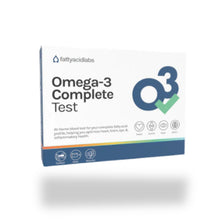
Therefore, you should measure your Omega-3 Index – a vital key figure for heart, brain and health
What is your Omega-3 Index – and why can it save lives?
Imagine if a simple blood test could reveal your risk of cardiovascular disease – and show you exactly how you can reduce it. That's what the Omega-3 Index does.
🩸 What is the Omega-3 Index?
The Omega-3 Index shows the amount of EPA and DHA – the two most important omega-3 fatty acids – in your red blood cells. The result is expressed as a percentage, and acts as a fuel gauge for your cellular health .
-
✅ ≥8% = Optimal level. Cardioprotective.
-
⚠️ 4-8% = Moderate risk.
-
❌ <4% = High risk of cardiovascular disease.
Despite knowing how important omega-3 fatty acids are for the heart, brain and inflammation, the majority of the population is below the optimal level . In the US, over 90% have levels that are too low. In Sweden, ArcticMed's data shows that 85% of all first-time testers are below 8%.
🧠 What does the research say?
Several large and modern studies show that the Omega-3 Index is one of the most powerful biomarkers for cardiovascular health – often more accurate than both cholesterol and blood pressure.
📊 1. Journal of Clinical Lipidology (2025)
A groundbreaking 10-year study of 2,550 people showed that a low Omega-3 Index predicted heart disease better than today's most common risk model (Pooled Cohort Equation) .
📄 DOI: 10.1016/j.jacl.2024.12.003
📉 2. American Journal of Clinical Nutrition (2021)
A systematic review and meta-analysis showed that people with a high Omega-3 Index had a 33% lower risk of dying during the study period compared to those with the lowest levels.
📄 DOI: 10.1093/ajcn/nqab194
❤️ 3. Framingham Heart Study
Data from the classic Framingham study shows that individuals with higher Omega-3 Index had fewer cardiac events, longer lives, and better cognitive function .
🌐 framinghamheartstudy.org
4. American Heart Association
Recommends increased intake of EPA and DHA via fish oil to reduce the risk of death from heart disease.
🌐 heart.org
🧬 5. Fatty Acid Research Institute
Founder Dr. William Harris, who developed the Omega-3 Index test, explains:
“Unlike genes or age, you can influence your Omega-3 Index – safely, easily and inexpensively.”
🌐 fattyacidresearch.org
🔁 Here's how to optimize your Omega-3 Index:
-
Test your levels – at home or through a healthcare provider
-
Increase your intake of EPA and DHA – through fatty fish or a documented supplement
-
Re-evaluate after 100–120 days – this is how long it takes for the blood cells to reflect the intake
-
Maintain the level ≥8% long-term – to benefit from the documented protective effects
🫒 Why ArcticMed combines Omega-3 with olive oil
ArcticMed's unique formula contains both highly concentrated omega-3 and extra virgin olive oil with high polyphenol levels – and it's not just in terms of taste.
-
🛡️ Oxidation protection: Olive oil protects the sensitive omega-3 fatty acids from being destroyed.
-
📈 Improved absorption: Fat-soluble nutrients like omega-3 are better absorbed into the body when taken with other healthy fats.
-
🔥 Synergistic anti-inflammatory effect: Polyphenols such as oleocanthal in olive oil have similar anti-inflammatory properties to ibuprofen - which enhances the effect of omega-3.
🧪 ArcticMed's test:
-Basic Omega-3 Index test that only shows the Omega-3 Index, a cheaper option for those who only focus on the Omega-3 level.
-Complete fatty acid test -More than just omega-3
Our advanced fatty acid test measures 24 different fatty acids in the blood – including:
-
Omega-6/3 ratio
-
Trans fat
-
Saturated fat
-
Anti-inflammatory index
-
Cell membrane balance profile
You will receive a clear report with recommendations - tailored just for you.
💬 Conclusion
Your Omega-3 Index is one of the most concrete, measurable and actionable tools you have to protect your heart, extend your life and optimize your health.
🎯 Call to action:
Do you want to know your Omega-3 Index?
Take an ArcticMed test at home and normally get a result within 14 days.
📦 Order your test here »






